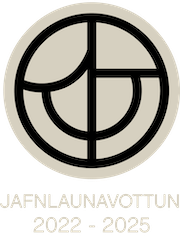Nýstárlegar PKS-NRPS-genaþyrpingar úr samlífisbakteríum - verkefni lokið
Fréttatilkynning verkefnisstjóra
The results of this project are relevant to both natural and possible industrial synthesis of unusual natural products with high bioactivities and specificities.
This
project aimed to examine the prevalence of unusual trans-AT PKS-NRPS pathways
such among bacteria in lichen and bryophyte communities, isolate strains and
carry out detailed genetic studies, including whole genome sequencing. Among
the objectives originally set forth and achieved were:
- Culture and
identify symbiotic bacteria associated with lichens and mosses that may carry
novel trans-AT PKS-NRPS gene clusters.
- Characterize
strains by 16S rRNA and rbcLX gene
sequences, and by trans- AT PKS-NRPS markers to prioritize strains of interest.
- Genome
sequence selected strains.
- Characterize
expression of gene clusters in lichen thalli and in cultures.
- Elucidate
chemical structures of pathway product(s).
Heiti verkefnis: Nýstárlegar PKS-NRPS
genaþyrpingar úr samlífisbakteríum
Enskt heiti: Novel PKS-NRPS gene clusters from symbiotic bacteria
Verkefnisstjóri; Ólafur S. Andrésson, Háskóla Íslands
Tegund styrks: Verkefnisstyrkur
Styrkár: 2013-2015
Fjárhæð styrks: 19,98 millj. kr. alls
Tilvísunarnúmer Rannís: 130455-05
 The results
are relevant to both natural and possible industrial synthesis of unusual
natural products with high bioactivities and specificities. The genome
information gained is applicable in a number of fields such as research on
natural products biosynthesis, research on diverse cyanobacterial symbioses,
research on the nature and control of biological nitrogen fixation, the
taxonomy and evolution of cyanobacteria, etc.
The results
are relevant to both natural and possible industrial synthesis of unusual
natural products with high bioactivities and specificities. The genome
information gained is applicable in a number of fields such as research on
natural products biosynthesis, research on diverse cyanobacterial symbioses,
research on the nature and control of biological nitrogen fixation, the
taxonomy and evolution of cyanobacteria, etc.
The primary outputs are two detailed publications, „Metagenomic natural product discovery in lichen provides evidence for a family of biosynthetic pathways in diverse symbioses“, published 2013 in the highly ranked journal PNAS, and „Distinctive characters of Nostoc genomes in cyanolichens“, to be published 2017. In addition, the project has contributed to one doctoral dissertation and several small student projects. This research has been presented at several meetings, domestic and abroad.


